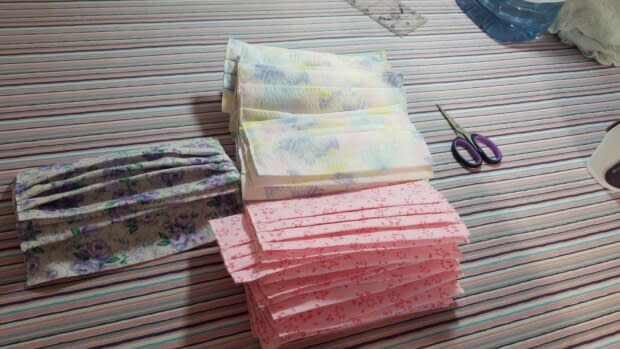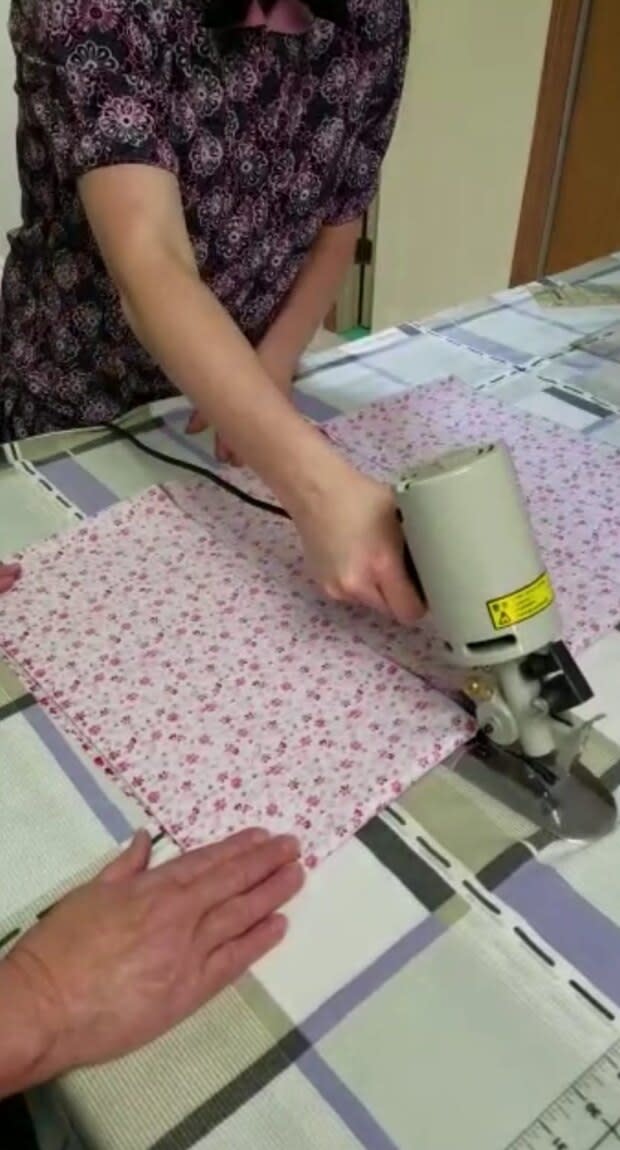Hutterite colony mobilizing to sew face masks to stop the spread of COVID-19
Calgary-area sewers, quilters and hobbyists are flocking to a new and urgent task — creating face masks to stop the spread of COVID-19.
One Facebook group, Mask Makers YYC, has made it their goal to mobilize quick-fingered sewers across the province to make and distribute the face masks.
This week, the women of the Pincher Creek Hutterite Colony joined the cause.
Volunteer Mary McDonald said a physician from Calgary, Dr. Janet Tapper, connected one of the women in the colony, Catherine Hofer, with the Mask Makers YYC Facebook group.
"In just three days, Catherine has mobilized a group of women and they are well on their way to making about 200 masks," McDonald told Daybreak Alberta.

The plan, McDonald said, is to distribute the masks to the local community, including the Kainai and Piikani First Nations and to other organizations in the community of Pincher Creek in the fight against COVID-19.
Any masks not needed locally will be shared with Mask Makers YYC to distribute to areas of need, McDonald said.
Mask Makers YYC was formed March 26 as a Facebook group and already has more then 1,660 members. The group is focused on making face masks that conform to a standard.
McDonald said the masks are cotton and use wire for the nose piece.
"It's got really nice fabric ties, it's got a little pocket inside the mask so that you can put some type of HEPA filter in there," McDonald said. "It's got pleats in there to make them comfortable, and properly folded so that the breath goes down.
"They put a lot of thought and effort into these patterns and they really seem to have it perfected."

Though Alberta has yet to offer a formal recommendation on masks, Dr. Deena Hinshaw, Alberta's chief medical officer of health, said Friday that there is evidence that masks can limit the spread of infection from those who are infected to others.
Canada's chief public health officer and health minister said medical-grade masks should be reserved for front-line health workers, but homemade masks are an option.
"It's nice that Health Canada has seen that. Also, we've seen other countries you know, South Korea and places like that, that have implemented the use of masks for the public and they're flattening the curve," McDonald said. "And to me it just makes common sense, it's spread by droplets.
"If there is a way that you can stop those droplets reaching another person's face and nose area, what can it hurt?"
The Mask Makers YYC Facebook group also provides information for the safe use of non-industrial masks.
"[It's about] knowing how to take them off properly, how to wash them and maintain them, so that we're not increasing the spread of this disease but rather just really trying to help with the protection aspect of it," McDonald said.
McDonald, who is a former nurse, said she couldn't help but get involved in this volunteer movement.
"I have a nephew and niece who are both physicians in Calgary," she said. "I've been in health-care most of my career and I just knew that that need was overwhelming. Then when I saw what they were doing, I just thought, you know what, we could bring this a little bit further and I really wanted to support that great cause."
But she gives all the credit to the sewers and those who are coordinating the distribution.
"I thought it would be great to give a big shout out to these wonderful ladies who are donating their time and supplies to help the various organizations within their community," she said. "And Mask Makers YYC have done an amazing job in coordinating the efforts of so many volunteers."
McDonald said she knows there are other groups of quilters and sewers working independently, and hopes they will soon join in.
Those who want to lend a hand can find out more on Facebook at Mask Makers YYC.

